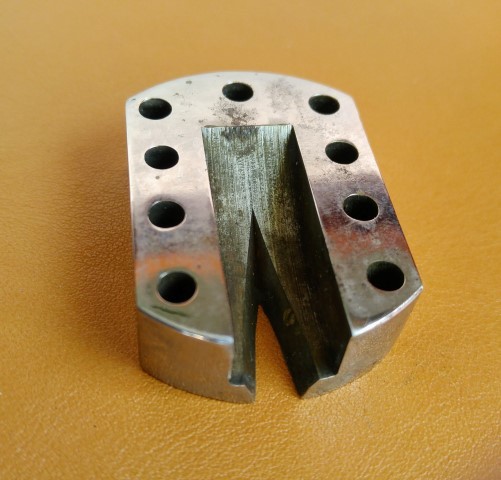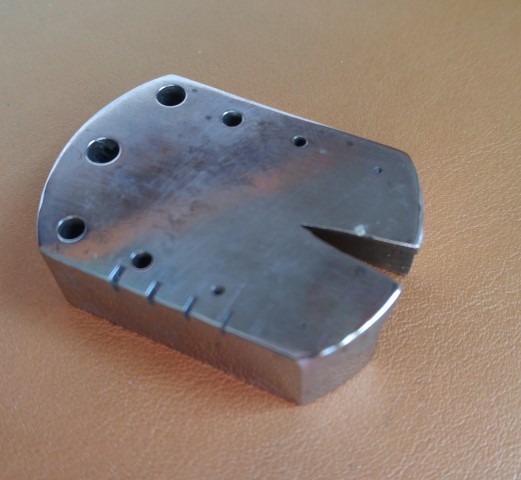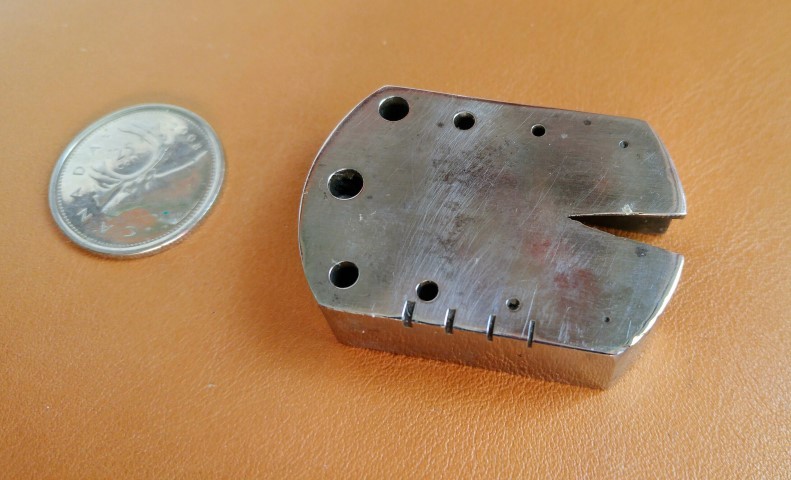I came to a similar conclusion at Gem City college. I finished the course and have a degree in Horology but I thought there is no way in hell I am going to do this for a living. Hand engraving is way more fun.
Thank you for your answer. I asked this question on couple of different forums and noticed that this question has been asked a lot, going back over a decade. Always it’s the same answer – no one knows. Based on responses by you and Peter Rowe out of dozens this go-round, the question is now answered. If anyone comes up with a photo of the slot being used as a holder, that would be great.
Hi, I have one too. I watched a guy use it. He make a nice rounded head on a wire that he balled the end with his torch. Stick the wire in the slot it fits, then tap the ball into a nice head. It flattens the bottom of the ball so that when you use the wire to plug, as a pin, the bottom of the ball is flat and flush so that it a nicer pin. You can also drill out the receptacle hole a bit to take the pin. It is to make a flat head pin, I’m pretty sure, you have to turn and tap and watch. Like most of the jewelers skills, you have to be focused and in the zone and meander to desired results.
When I’ve fused ends of wire to form a ball still attached to the wire, I then slide it onto the same size hole in the block as wire gauge and shape the head of what is going to be a decorative showing rivet. You can make it look like a screw head or any other shape .Then use it as a decorative rivet on your piece.
I probably still own one but I have no idea where it is anymore. I do hand engraving and custom jewelry work. I make a rivet by tapping on the end of a wire with a small ball pean hammer.
I agree, but can’t do much there unfortunately… that feature is built in to “Discourse” which is the forum software…
Hi-
Long time lurker - first time poster-
Here’s a video showing how to use the riveting anvil to make headpins. It’s at the 1:24 mark. Still doesn’t answer the questions about the slots.
I sometimes wonder if I’m the only watchmaker on Ganoksin. I keep telling watch makers on watch making forums that questions which utterly baffle them are everyday problems for jewelers, and there is a tremendous amount they can learn on Ganoksin, but nobody has followed me, so far at least. John Wades post is correct. the slots are used for holding pallet forks. I also use them occasionally for working on watch hands. The holes are used for working on gears and balances or anything round you want to put in a hole to steady it while you work on it.
I might add that in addition to the Hexagonal riveting block, there is also a round one that some watch makers use. This has a tapering “V” shaped slot that allows you to remove the roller table, which is part of the balance wheel. If you ever come across one of these, that’s what it’s for.
There are two of us here. I just refuse to do it for a living because my liver could not take all the booze I was ingesting trying to stay sane.
Bill – thank you for your answer. Do you have an image of this hex block in use?
Hi Bill.Tokyo
i knew you would be able to enlighten us!
thank you!
julie
If I had stayed in the States, I wold have done the same thing or worse. Gone to the North Pole to talk to Polar Bears. As it was, seeing as how I ended up in Japan, it’s considerably easier to make a living in the watch business than in the jewelry business. Japan (unfortunately) has no tradition of jewelry at all. It simply wasn’t worn with Kimono. Jewelry didn’t come in until Western culture flooded this place from about 1890 onward, so the appreciate of it is pretty shallow, and often very quirky: for example, weddings rings (a foreign custom) are traditionally made out of platinum here.
Every jewelry forum needs a curmudgeon watchmaker. Glad to play the role 
Sorry, I searched through all my books, but couldn’t find an actual picture of it in use. I did however learn a few more things about the “V” shaped grove that it was useful for other watch repairs involving the balance.
There is at least one video of it in use on youtube.
Jerry in Kodiak
My riveting block is by Vigor and has the features mentioned. I always wondered the use of the V
Hope this helps
Aurora



The bottom two photos are right side up. The “V” shape would hold the balance, which is a quite complex miniature piece of machinery without damaging any of it’s parts. As well as being able to take off the roller table (this could also be done using a Seitz tool and special punches in the staking set, for all you budding watch makers out there) it was also very useful for wedging the balance in place if you wanted to adjust the position of the hairspring collet to put the watch in beat
or when truing the hairspring. I still use mine from time to time for either of these purposes.
As well as the slots being excellent for holding pallet forks when working on them, I suspect (but have never measured) that the slots are one, two, three and four lignes wide. There were 12 lignes to the ouce, a French inch. Lignes sizes are used to this day to measure the size of watch movements, and it is common to refer to a watch as a 10 or 12 lignes movement. I suspect the slots were to measure the thickness of pieces of metal when being worked down by hand in the old days. Watch makers are exceptionally conservative. Lignes went out of use in the rest of the world with the French revolution when the metric system was adopted, but they stay in use in this limited degree in the Swiss watch industry to this day.
Thank you so much for the additional information Bill; much appreciated. I will send it to my brother who has been refurbishing old pocket watches as a hobby many years now. He was intrigued by my wee rivet block and wondered what it was used for. I’ll probably gift it to him and get myself another rivet block.
Thank you again!
Aurora